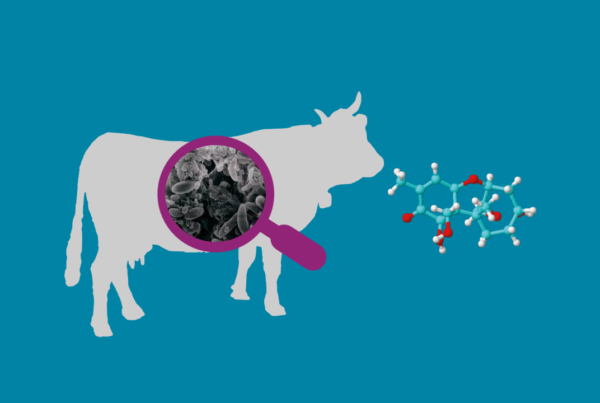Olmix Group has become one of the major global specialists in marine biotechnology and green chemistry and offers algae-based solutions for plants, animals and humans to build a healthy food chain, based on circularity, reduction of pesticide, antibiotic and chemical additive use.
For 10 years now, the focus of Olmix Group has been to identify and evaluate the biological activities of algal extracts. Indeed, macroalgae are rich in sulfated polysaccharides known for their diverse activities such as antioxidant, antitumoral, antiviral, antimicrobial… Olmix has developed a strong know-how in the selective extraction of macroalgae active principles (Olmix MSP®) to ensure a targeted effect on animals. The process is patented and some specific activities too! The final goal is to develop a fully natural and sustainable range of additives to improve health and performance and finally reduce the use of antibiotics in animal nutrition.
Algae, a source of biological treasures: the sulfated polysaccharides!
Macroalgae, or seaweeds, are eukaryotic and pluricellular organisms, divided in three different groups: green, red and brown. Detailed screening of macroalgae functions revealed new ranges of biological activities including anticoagulant, antiviral and antibacterial, anti-tumoral, anti-proliferative and immuno-modulatory activities. All of them could be of relevance in nutraceutical functional food (Wijesekara et al., 2011a). Indeed, green, brown and red macroalgae cell wall contains large amounts of sulfated polysaccharides, named respectively ulvans, fucoidans and carrageenans, ranging from 4 up to 76% of seaweed dry weight (Holdt et al., 2011). The high content of these sulfated polysaccharides, their unusual structure, and their biological properties shed a new light on these compounds as promising natural products for medicinal and dietary applications (Rioux et al., 2007; Laurienzo et al., 2010).
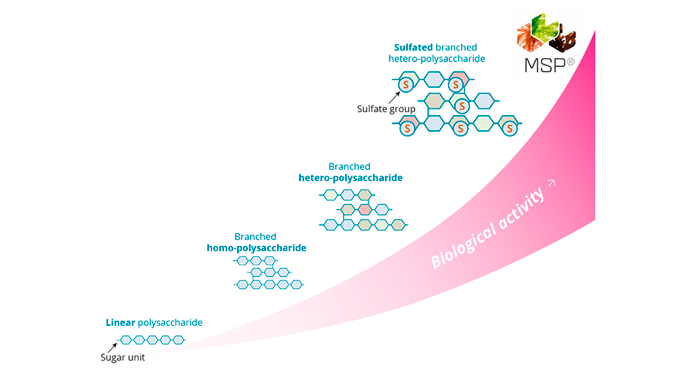
The specificity of marine algae polysaccharides stands in the complexity of their structure. they are often branched polysaccharides, in contrast with linear polysaccharides like cellulose which contain only one type of linkage between sugars. Also, they are composed of various and some rare sugar units (xylose, rhamnose), unlike homo-polysaccharides like starch which are exclusively composed of glucose units. Finally, these sugars can be sulfated, conferring them a special reactivity. The whole of these parameters shows a phylogenic similarity with polysaccharides from the animal kingdom (GAG’s – glucosaminoglucans) such as heparin, known for its numerous biological properties, thus explaining their unique activities. Sulfated polysaccharides reactivity, hence their biological properties, varies a lot according to the type of sugars and linkage they contain, their level of sulfation and also their molecular weight. Therefore, several macroalgal sulfated polysaccharides with distinct biological activities can be found in macroalgae.
Important to notice that sulfated polysaccharides are specific to macroalgae (they are not found in terrestrial plants, nor freshwater microalgae or yeast cells walls) as marine environment is the only one where sulfur in a proper chemical form is abundant enough to be integrated in the structure of organisms.
Then, the key is to be able to selectively extract them to ensure a targeted effect on animals, this is where Olmix differentiate from the competition!
The research done by Olmix has led to the development (extraction and objectivation) of 5 specific MSP® to address animal production challenges, especially in gut health, immunity, digestive welfare and digestive efficiency domain:
- MSP®LIPIDS to regulate lipid metabolism,
- MSP®MUCIN to boost mucin production in the intestine,
- MSP®ANTIMICROBIAL to inhibit the growth of pathogens,
- MSP®IMMUNITY to modulate immune response,
- MSP®BARRIER to reinforce gut integrity.
MSP®LIPIDS: Algal extract to improve lipid metabolism
The capacity of algal polysaccharides to improve liver metabolism was first evidenced by Pengzhan et al. (2003), who highlighted the capacity of ulvans (sulfated polysaccharide from green algae Ulva sp) to lower the level of liver pathologies in rats while decreasing their levels of triglycerides (TG) and increasing the excretion of bile acids in the feces. Qi et al. (2011, 2012) also highlighted the anti-hyperlipidemic properties of ulvans. While the positive control group (fed a hyperlipidemic diet) had a disbalanced profile of lipids, the supplementation with ulvans highly significantly balanced it.
Based on this, Olmix has worked on the extraction of a specific MSP with enhanced anti-hyperlipidemic properties: MSPLIPIDS. Used in the complementary feed DigestSea, MSPLIPIDS allows to stimulate liver metabolism of animals (sows, layers, dairy, aqua species…).
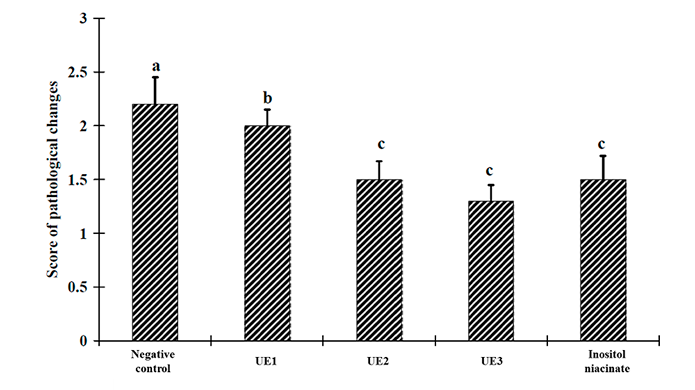
Figure 1: Effect of various green algae MSP: ulvan extracts (UE) on inhibiting pathological changes in the liver, in comparison with negative control and positive control (inositol niacinate). Scoring: mild = 1, moderate = 2, severe = 3. Different letters are significantly different (P<0.05 by one-way ANOVA). Adapted from Pengzhan et al., 2003.
MSP®MUCIN: for improved digestive welfare
Olmix has been working on the capacity of some MSP to protect the intestinal epithelium by stimulating the production of mucin in the gut. Intestinal mucins are large glycoproteins secreted by goblet cells in the intestine. They constitute the mucus gel that coats the intestinal epithelium (Specian and Oliver, 1991) and protects it. The mucus layer prevents the attachment and colonization of bacteria in the intestinal tract and limits the intestinal absorption of toxins. Therefore, stimulating the production of mucin in order to protect the intestine turns out to be a relevant strategy to support intestinal development and to prevent digestive disorders. In 2000, Barcelo et al. demonstrated that MSP from Ulva sp stimulated the excretion of mucin from goblet cells, highlighting its potential protective use against various intestinal diseases.
From this, Olmix has developed a full range of products (Sealyt, Ecopiglet, Seagut powder and Seagut paste) to support digestive welfare of animals, relying on its MSP®MUCIN, which reinforces the intestinal mucus layer.
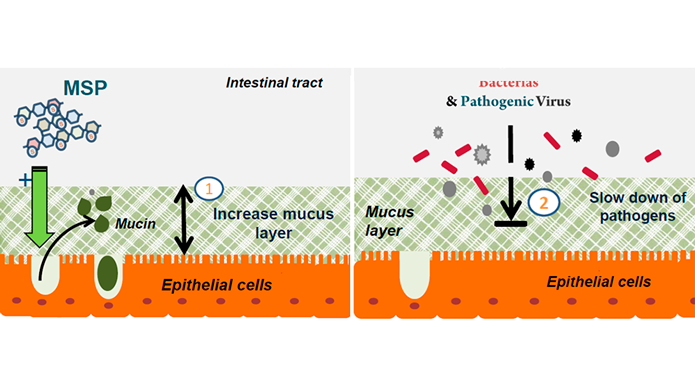
MSP®IMMUNITY: to support natural defenses
Extracted from the green algae Ulva sp, MSP®IMMUNITY was identified as an immune modulator. A research project in collaboration with INRA (France) led to the demonstration of its effect on immune mediators in cellular models, including the identification of the metabolic pathways involved in this activation. Berri et al. (2016) first highlighted that MSP®IMMUNITY could stimulate the gene expression of several immune mediators (cytokines and chemokines). Among others, the extract showed to upregulate the expression of TNFα, involved in the innate immune response, CCL20 and IL-1α, working on the adaptive immune response, and PPARγ which has anti-inflammatory properties (Figure). In vivo studies further confirmed that MSP®IMMUNITY could support the development of the adaptive immune response in broilers (decreased heterophil to lymphocyte ratio) and higher production of immunoglobulins (IgA). MSP®IMMUNITY is included in Searup® and ALGIMUN®.
MSP®BARRIER: to optimize gut integrity
Olmix Group also identified some extracts of interest targeting gut barrier function. A set of experiments was implemented with IBD Lille (France) to define if the identified extracts would trigger the production of mucins and improve tight junction protein expression, using in vitro models (mucus-secreting HT-29 MTX cells for mucin evaluation and enterocyte-like Caco-2 cells for tight junction evaluation). Results showed that MSP®BARRIER (from Solieria chordalis) induced the expression of both mucins and tight junctions the main elements reinforcing gut integrity. MSP®BARRIER is associated with MSP®IMMUNITY in ALGIMUN®.
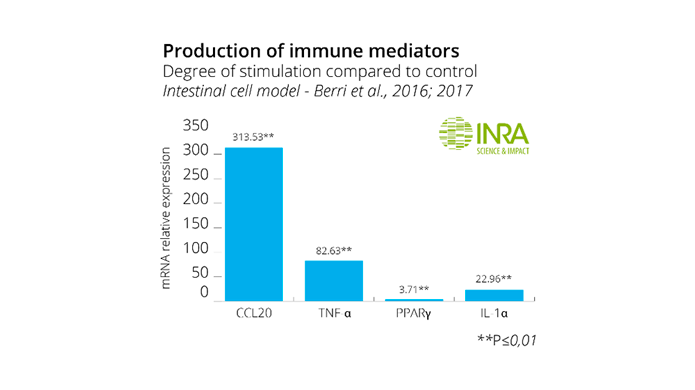
MSP®IMMUNITY.
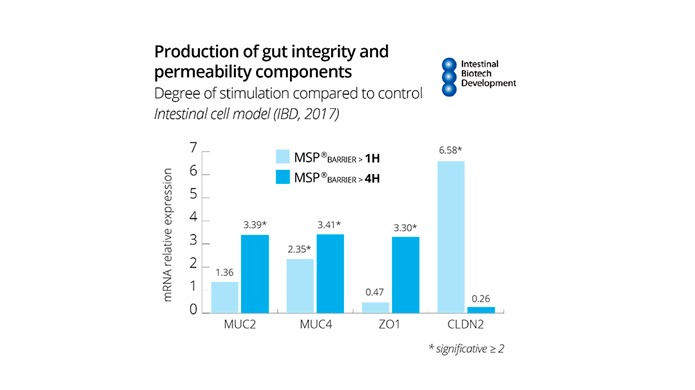
MSP®IMMUNITY.
MSP®ANTIMICROBIAL
Low molecular weight molecules from the green algae Ulva have, in collaboration with INRA, been shown to limit the growth of Gram-positive and Gram-negative bacteria isolated from clinical material of infected farm animals in a highly specific manner. The antimicrobial activity of MSP being different between species within the same genus of bacteria. The mode of action of the inhibition remains to be elucidated.
In conclusion
Olmix already extracted several MSP® from macroalgae with targeted biological activities which have turned to efficient commercial products to help farmer produce better. But algal science is at its infancy! thus Olmix will continue to work with renowned institutes to evaluate new potential activities from macroalgal extracts.


